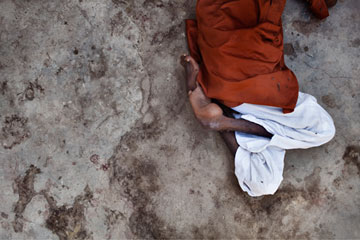
A great scourge might soon be gone, but war, mistrust and even the death of Osama Bin Laden could get in the way the children in gadap town like to play tea party. There are no little tea sets here, not in this densely packed, grindingly poor Pakistani slum, the biggest in the megacity of Karachi. So children scavenge bottle caps from piles of trash near the foul-smelling stream that flows through the town. Using them as cups, they sip the filthy water, imagining perhaps what it would be like to sit down at a real tea party one day.
What the children don't think about is the poliovirus that swirls in the water, deposited there by human waste--the biggest reason the stream is so foul to begin with. They know nothing of the way a capful of water can introduce the virus to the mucus membranes of the mouth, where it binds with cells in the pharynx, replicates there and then migrates to the gut and the lymph system--multiplying explosively all the while--until it finds its way to the central nervous system, slaughtering the motor neurons that allow muscles to move as they should, leading to paralysis of the legs, sometimes the arms and occasionally the muscles that control breathing.
But Salma Khan thinks about that kind of thing a lot. Just a few months ago, her son Bilal would race tirelessly around their family compound in Sango, far to the north of Karachi, chasing his twin sister Urooj. Then one day he developed a fever that quickly grew worse. Within days, he could no longer walk. Today, Khan holds her son in her lap, lifts his left leg and watches as it drops limply back down. Just 18 months old, he is a toddler who can toddle no more. "Now all my dreams are shattered," she says. "He will be paralyzed for life."
The particular poliovirus that claimed Bilal's legs probably came from Gadap Town. Genetic profiling has tracked the slum strain to all four Pakistani provinces as well as to Afghanistan and China. "Gadap Town is a polio factory," says Dr. Salah Tumsah, a polio expert with the World Health Organization (WHO). It's not the only such factory in the country. Anyplace there's an open sewer or an unclean dish, anyplace children come into contact with children, the virus could be growing.
Pakistan once had plenty of company in battling the polio scourge. As recently as 1988, the disease was endemic to 125 countries, paralyzing or killing 350,000 people each year--mostly children. Thanks to exhaustive medical, philanthropic and political teamwork, the virus has been routed, corralled into only three countries: Pakistan, Afghanistan and Nigeria. In 2012, there were only 215 cases worldwide. Only one other time in human history has a disease--smallpox--been wiped out in the wild. Polio, that fearsome crippler of children, scourge of peasants and Presidents, could soon become the second, unless the entire crusade, so close to completion, itself becomes a casualty of war.
In December, during a polio-vaccine drive in Pakistan, nine field workers--six of them women or teenage girls--were killed in motorcycle drive-by shootings linked to the Pakistani Taliban. On Jan. 1, six more women and one man--all of them medical aid workers--were similarly shot to death. All of that bloodshed followed a Taliban order last June to halt the scheduled immunization of 161,000 children in North Waziristan province until American drone strikes stop.
